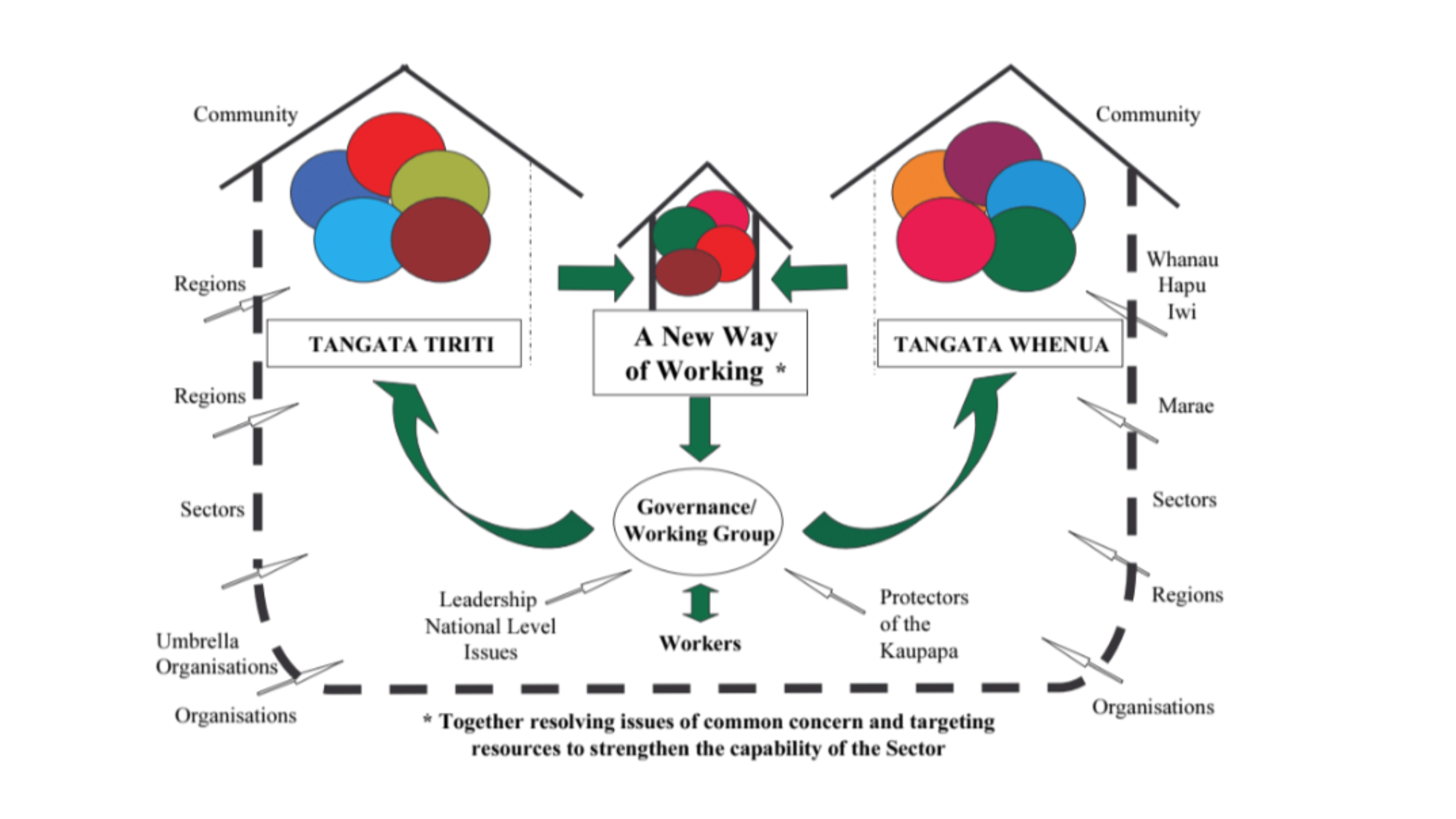Our Whakataukī

Ko te hōkai nuku
Ko te hōkai rangi
Ko te hōkai a tō tupuna a Tānenuiarangi
This whakataukī was gifted to Community Research by Leon Hawea at the time of our creation.
The whakataukī tells how Tāne asended to Te Toi-o-ngā-rangi, the highest heaven, to obtain ngā kete o wānanga – the three kete (baskets) of mātauranga (knowledge) – and bring down to earth for all to share.
Human life and knowledge were said to originate in the realm of Ranginui (the sky father).
The three baskets of knowledge are:
- te kete tuauri, the basket of light, which held the knowledge of ritual memory, prayer and spiritual communication.
- te kete tuatea, the basket of darkness, which contains knowledge of evil, or mākutu, which was harmful to humanity.
- te kete aronui, the basket of pursuit, which held all the knowledge that could help humanity.
Knowledge of these kete is important to sustain tuarite, or balance.
Applied in the context of research it is a reminder to us of the tikanga, or processes, that are required to maintain this balance and ensure that the mana of all participants and subjects are upheld.
In the wider context of day-to-day life this knowledge is fundamental to maintaining balance within our communities, with our loved ones, and within ourselves.
This whakataukī has been represented in the image, created by Izzy Joy, which adorns our website.
Read how Izzy created this for Community Research here.
Our Te Tiriti o Waitangi Commitment
From our beginning
Community Research has been operating under a te Tiriti o Waitangi Relationship Framework from its inception. Our approach to te Tiriti was guided by a Community Sector Taskforce document ‘A New Way of Working for the Tangata Whenua, Community & Voluntary Sector in Aotearoa/New Zealand (2006)’. This document provides a baseline and some guidelines for Sector organisations wanting to work within this model.
The model recognises the special place of Tangata Whenua in Aotearoa and the rights and responsibilities associated with that in the following ways:
- Firstly, it recognises that Te Tiriti O Waitangi/Treaty of Waitangi was signed between Māori and the Crown.
- Secondly, it recognises that Tangata Whenua have suffered grievances as indigenous people of this land.
- Thirdly, it recognises that Tangata Whenua have the right and the responsibility to manaaki all Tangata Tiriti who come to Aotearoa in a manner that expresses Tikanga Māori and acknowledges cultural worldview difference.
THIS MODEL ILLUSTRATES THE GOVERNANCE STRUCTURE USED BY COMMUNITY RESEARCH

FIGURE 1 – FROM ” A NEW WAY OF WORKING FOR THE TANGATA WHENUACOMMUNITY AND VOLUNTARY SECTOR IN AOTEAROA / NEW ZEALAND, COMMUNITY SECTOR TASKFORCE, 2006
Our ongoing commitment
We are committed to centring Te Tiriti o Waitangi in everything we do and to implement Te Tiriti actively and honourably through our kaupapa.
Te Tiriti is interpreted via its Articles and the Principles. We agree that the Articles and Principles support meeting tangata whenua rights and needs.
Te Tiriti o Waitangi has three Articles and the Ritenga Māori Declaration. These articles and the declaration underpin our obligations and opportunities.
Article 1: Kāwanatanga
This article reflects tangata whenua’s agreement to enable tangata Te Tiriti to govern their own people in Aotearoa New Zealand. In return, there was a promise to protect Māori culture and to enable Māori to live as Māori in Aotearoa, New Zealand. This article can be practised through kaitiakitanga (stewardship) of systems and practicing governance in honourable and Rangatira-to-Rangatira ways.
Community Research recognises its unique roles as a kaitiaki of community –led research and in providing a platform to share that research with others to bring about positive change for tangata whenua and all New Zealanders.
Article II: Tino Rangatiratanga
This article recognises the importance of tangata whenua authority and autonomy. This article can be practised through supporting Māori to exercise authority over their self-determined wellbeing.
The role of the research in contributing to decolonising knowledge, relationships, power and privilege is critical. Communities have a right to participate in the research findings feedback and to assist with the analysis and reporting of information.
Community Research supports tangata whenua mana motuhake and tino rangatiratanga and is committed to sharing research and resources that support Māori aspirations.
Article III: Ōritetanga
This article requires equitable outcomes for tangata whenua. This article can be practised by ensuring that roles and functions prioritise achieving equity of access, experience, and outcomes for tangata whenua.
Community Research prioritises kaupapa that offers solutions that interrupt persistent inequities experienced by Māori whānau, hapū and iwi.
Ritenga Māori Declaration: Wairuatanga
This declaration (sometimes referred to as the fourth article) upholds the importance of tangata whenua belief systems, worldviews, and values. The Declaration can be practised by supporting Mātauranga Māori.
Community Research seeks to support all forms of Māori knowledge.
